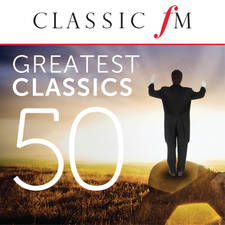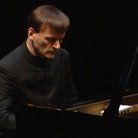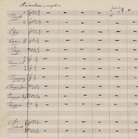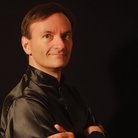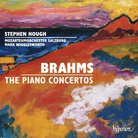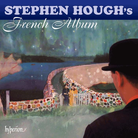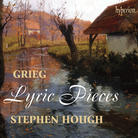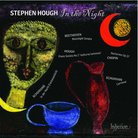Classic FM Meets Stephen Hough
He's come along way since leaving his roots in the North-West but, as Stephen Hough explains to Classic FM, his talent is an ongoing journey.
“One minute I was thinking that the first rounds of a piano competition at the Juilliard were a long shot and not bothering to practise; the next minute I was in the final at Carnegie Hall – and then I won!”
Scooping first prize at a major competition is certainly one way to kick-start your career, though not necessarily one Stephen Hough would recommend.
“At 21 I suddenly had to be grown up: I had a manager and concerts, and frankly I wasn’t prepared. For a start I had to learn an enormous amount of new repertoire – I had seven concertos to memorise and perform that first year!”
We’re talking about the venerable Walter Naumburg International Piano Competition that takes place in New York every three years, and which Stephen won in 1983. As he reminisces, it’s interesting to think that this fine, thoughtful English pianist has been out on the international circuit for more than 20 years. His recordings have won countless awards, but he hasn’t perhaps attained the level of fame and fortune that his early honours indicated.
All this is now changing – more of that later – but Classic FM suspects that’s exactly the way Stephen would have planned it; a calm, challenging and interesting journey into the spotlight. But let’s get back to that competition. It was a high point in his time at Juilliard, the renowned New York school of music, an experience that otherwise Stephen didn’t really enjoy.
“To be honest I didn’t like my piano teachers at the Juilliard. In fact the only course I liked was one on the history of Western culture, taught by a professor from Columbia University! Having said that, I loved being in New York in the early 1980s. It was still very Bohemian, especially in Greenwich Village. You would hear the last generation of Jewish immigrants speaking Yiddish everywhere – they formed the backbone of the New York community. They’ve all gone now – they either died or moved out. They were such characters though!”
Classic FM is still intrigued by the shock competition win, though. Surely he must have been bowled over by playing at Carnegie Hall?
“Well, yes, Carnegie was a pleasure – the piano was glorious and I had no expectations – it was just great to play in that space. I wouldn’t be so relaxed now. The longevity is the challenge; you want to be asked back, and you have to get better, look for new challenges and new interpretations, and that can’t be faked. It has to be a holistic process. Not everyone loves you all the time. There’s a certain amount a manager can do but, like with politicians, it’s the people who have the vote!”
His love affair with New York has continued. We’re chatting near his home in north London but in fact he’s had his apartment in Manhattan longer than any other home. As he puts it, he has pianos, clothes and friends there, so it’s very self-contained.
Like all successful international performers, much of Stephen’s life is spent on the road, but as we talk he is trying to negotiate a bit more time off at home in London, where he has a separate practice studio and a warm affection for the bacon sandwiches at his local café. “You’ve got to get the small, thin man to make the bacon extra crispy and I think you’ll have a most pleasant experience!” We’ll be there, Stephen, we’ll be there!
He may be a convinced urban dweller now – “I love being in the city where you can be busy, yet alone” – but Stephen actually grew up in Thelwall, near Altrincham, just south of Manchester. He was an only child, and the sole musician in the family.
“My aunt Ethel had a piano; I think that was the first I played. It was love at first sight. I begged my parents to let me learn. Finally they bought an old German upright for £5 – probably quite a nice piano, actually!
“I learnt with Miss Riley, who had orange lipstick and a powder-blue bubble car, but my mother knew she wasn’t keeping up with me. Mum had a friend who had connections with the Royal Northern College of Music, so I went there to learn with Heather Slade.”
It was at the tender age of eight that Stephen’s life really changed, when he received a special mention from a judge in the north-west junior piano competition.
“There was lots of press attention – you know, the ‘Is this the new Mozart?’ type of thing. I was in all the papers. Hughie Green wanted me on his show. My parents said ‘No,’ thank goodness! I was very distressed by it, actually.”
There was no question, however, that the piano would be Stephen’s life, and he was quickly accepted as a pupil at the Manchester music school, Chethams.
“It was rather chaotic in the 1970s, though it’s super now. It needs to be strictly run, and wasn’t then: it was rather explosive and there were lots of depressed students.”
Of whom Stephen candidly confesses to being one. “No, they weren’t very happy years. I wasn’t a boarder and I had a long journey from Thelwall. I was doing concerts, too many perhaps, and had a kind of mini-breakdown at 12 so I took a year off. I did my ‘O’ levels at 15 and just ducked into the RNCM bachelor course, rather young.”
Happily, better times were on their way. “I loved the Royal Northern, I loved my teachers – Gordon Green, then Derrick Wyndham – they were both huge influences on my life. It was a very good experience. And I got my own flat at 16 – I thoroughly enjoyed that!”
Despite his move soon afterwards to the States, Stephen stayed close to his parents – indeed his mother still comes to his concerts when she can.
“I may be the only musician in the family but my father was immensely musical. He came to all my piano lessons and had a huge knowledge of music; his ear was very sharp, and he wrote and painted. He was a technical rep for British Steel which was not his love.
“He died at 54, just when we were starting to have so much in common. He was born in Australia, which means I got my Australian passport last year. I love it there – I go when I can, and really enjoy playing there. I was thrilled to get citizenship – it drew various threads of the family together, and it would be great to spend more time there in the future.”
But really we’re here to talk about Stephen’s excellent disc of all four Rachmaninov concertos; the first live recording of the cycle. I mentioned earlier that he’s now finding his way into the spotlight, and this recording is the reason why. He’s had rave reviews: it’s been described as the definitive recording of the works, and you can tell that it’s a project Stephen himself is extremely proud of.
“I didn’t want to do just another cycle but then doing it live seemed a great idea. And recording in Dallas with Andrew Litton conducting – he’s a good friend – was a bonus.
“Rachmaninov was such a genius writing for the piano. He had large hands but the phrases fit like a glove. We have so much information about him, about how he played, and ever since I started to play I’ve been attracted to that style of performance, rather than the contemporary way. I like the rubato, the vocabulary of it. It’s difficult to describe without listening to it! And some rubatos are so free they are almost comical.
“But then artistic styles do change. Think of actors like Olivier, or the words of Coward or Wilde – they’re so different to today’s. Or the decoration of the late Victorians: they didn’t do things by half! It’s all part of the same movement.” Stephen’s really on a roll now – it is his passion after all.
“Tempos have changed – Rachmaninov played much faster. And look at the way stringed instruments are played now – it’s much cleaner, while then it was more expressive and sliding. I suppose it’s like a dialect; it’s subtle but you can always hear it. These are all vital factors in the interpretation of music. We have the score but you also need so much context – and of course your own voice is critically important too.”
Stephen Hough’s passion, knowledge and intelligence shine through in the recording – Classic FM can vouch for that. This is a CD to add to your collection straight away.
